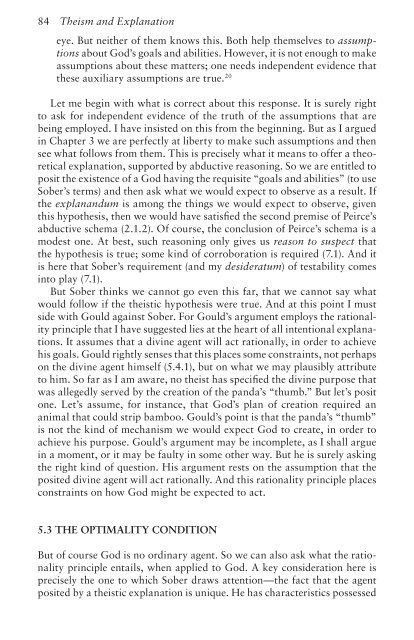Theism and Explanation - Appeared-to-Blogly
Theism and Explanation - Appeared-to-Blogly
Theism and Explanation - Appeared-to-Blogly
You also want an ePaper? Increase the reach of your titles
YUMPU automatically turns print PDFs into web optimized ePapers that Google loves.
84 <strong>Theism</strong> <strong>and</strong> <strong>Explanation</strong><br />
eye. But neither of them knows this. Both help themselves <strong>to</strong> assumptions<br />
about God’s goals <strong>and</strong> abilities. However, it is not enough <strong>to</strong> make<br />
assumptions about these matters; one needs independent evidence that<br />
these auxiliary assumptions are true. 20<br />
Let me begin with what is correct about this response. It is surely right<br />
<strong>to</strong> ask for independent evidence of the truth of the assumptions that are<br />
being employed. I have insisted on this from the beginning. But as I argued<br />
in Chapter 3 we are perfectly at liberty <strong>to</strong> make such assumptions <strong>and</strong> then<br />
see what follows from them. This is precisely what it means <strong>to</strong> offer a theoretical<br />
explanation, supported by abductive reasoning. So we are entitled <strong>to</strong><br />
posit the existence of a God having the requisite “goals <strong>and</strong> abilities” (<strong>to</strong> use<br />
Sober’s terms) <strong>and</strong> then ask what we would expect <strong>to</strong> observe as a result. If<br />
the explan<strong>and</strong>um is among the things we would expect <strong>to</strong> observe, given<br />
this hypothesis, then we would have satisfi ed the second premise of Peirce’s<br />
abductive schema (2.1.2). Of course, the conclusion of Peirce’s schema is a<br />
modest one. At best, such reasoning only gives us reason <strong>to</strong> suspect that<br />
the hypothesis is true; some kind of corroboration is required (7.1). And it<br />
is here that Sober’s requirement (<strong>and</strong> my desideratum) of testability comes<br />
in<strong>to</strong> play (7.1).<br />
But Sober thinks we cannot go even this far, that we cannot say what<br />
would follow if the theistic hypothesis were true. And at this point I must<br />
side with Gould against Sober. For Gould’s argument employs the rationality<br />
principle that I have suggested lies at the heart of all intentional explanations.<br />
It assumes that a divine agent will act rationally, in order <strong>to</strong> achieve<br />
his goals. Gould rightly senses that this places some constraints, not perhaps<br />
on the divine agent himself (5.4.1), but on what we may plausibly attribute<br />
<strong>to</strong> him. So far as I am aware, no theist has specifi ed the divine purpose that<br />
was allegedly served by the creation of the p<strong>and</strong>a’s “thumb.” But let’s posit<br />
one. Let’s assume, for instance, that God’s plan of creation required an<br />
animal that could strip bamboo. Gould’s point is that the p<strong>and</strong>a’s “thumb”<br />
is not the kind of mechanism we would expect God <strong>to</strong> create, in order <strong>to</strong><br />
achieve his purpose. Gould’s argument may be incomplete, as I shall argue<br />
in a moment, or it may be faulty in some other way. But he is surely asking<br />
the right kind of question. His argument rests on the assumption that the<br />
posited divine agent will act rationally. And this rationality principle places<br />
constraints on how God might be expected <strong>to</strong> act.<br />
5.3 THE OPTIMALITY CONDITION<br />
But of course God is no ordinary agent. So we can also ask what the rationality<br />
principle entails, when applied <strong>to</strong> God. A key consideration here is<br />
precisely the one <strong>to</strong> which Sober draws attention—the fact that the agent<br />
posited by a theistic explanation is unique. He has characteristics possessed



